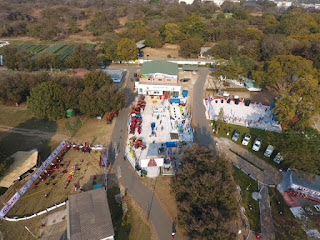AGRICULTURE SHOW SOCIETY, AFRICAST LAUNCH SMARTSHOW APP.
AFRICAST
Events Technology and the Agriculture and Commercial Society of Zambia developed a Mobile Application on Google play store duped “Smartshow event
technology” a tool aimed at creating easier navigation for show goers at the
90th Agriculture and Commercial Show.
The
app which is made its debut at this year’s edition will enable show goers view
all exhibitors’ stands, view daily events programs as well as see a list of
awards and participants.
The
smart mobile application tool is an invention of Africast Conference and
exhibition managers the company which has investment in Botswana Zimbabwe and
South Africa, designed the mobile application to assist, visitors to navigate
displays, without hindrances.
The
home grown, mobile application has challenged the global status quo which has
over the years witnessed dominance of software development business led by
Indian and South African ICT firms, who in addition to manufacturing their own
ranges, also produce on behalf of international firms.
And
AFRICAST, Social Media Communication specialist Ketiwe Zulu Millennium radio
Business News that the unique electronic invention, shares pertinent data with
the users such as real time programs and speaker among other features, during
the event.
Ms.
Zulu said an event planning company, Africast developed the application to help
show goers save time during planning and get users more independent and
organize their schedule.
“It reduces the element of over reliance on
local experts for directions, this is a very important tool in a media
personnel’s tool kit, it allows for easy planning and time saving during busy
moments during the events, especially for journalist who are bound to beat
deadlines,” Ms. Zulu said.
 |
| Khetiwe Zulu |
Ms.
Zulu said the development came at the a right time when the Show theme is
Managing Environment for Growth because it will help the show society in
innovation and technology.
She
said the show society can only succeed in managing environment for growth they
invest in technology.
“Smartshow is about good planning, it cuts out
that manual work, such as writing and wasting both ink and paper. It is just an
environmental friendly product offering electronic services that provides easy
communication on time, with provision of maps, events program and speakers
among other factors,” said Ms. Zulu.
However,
the mobile application is a buildup on the other complimenting events
management provision but said it was facing challenges such as unliable
internet provision.
And
show goers expressed excitement at the new innovation between Africast and show
society which is designed to assist, visitors to navigate displays, without
hindrances.
The
Show provides a forum for exchange in agriculture, agribusiness, trade
information and commercial as well as creating opportunities to show case
emerging farming technologies, product innovation and value addition















